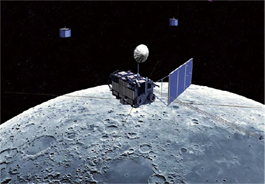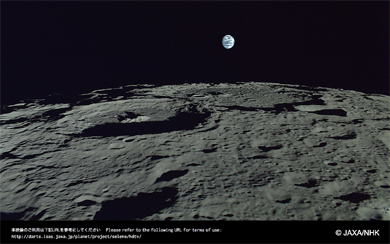Kaguya
Contents
Kaguya (SELENE)
(glossary entry)
Credit: Kaguya (Selene)
Description
Japanese lunar exploration satellite, launched on September 14, 2007, and operating in lunar orbit until June 10, 2009. Its complement of instruments included high resolution cameras, spectrometers, altimeters and a pair of high definition television cameras used to collect moving images of the Moon as seen from orbit. It viewed the Moon from a distance of about 100 km.
Additional Information
- Officially known as the SELENE mission, following Japanese tradition, the orbiter was renamed after its successful launch, to Kaguya. There are also two sub-satellites in lunar orbit, now known as Okina and Ouna, that are used for probing the Moon's gravity field.
- The main website includes a 2-page PDF brochure briefly describing the mission objectives and instruments.
- The still Image Gallery can be viewed only via an Adobe Flash interface. Click on the boxes near the top of the screen to select pages related to results from the different instruments (e.g. "TC" = terrain camera), then use the "Previous" and "Next" buttons that will appear near the bottom of the page to step through the pages. The Japanese and English versions of the gallery are not identical. Entries tend to appear first in the Japanese version, and then later in the English one.
- Video presentations are in a separate gallery.
- The Japan Broadcasting Corporation (NHK), which is a sponsor of Kaguya's High Definition Television (HDTV) experiment, has a separate Gallery of still and video images, focused especially on pictures showing the Earth. Clicking on the blue dots on the Nearside/Farside maps displays the images shown separately in the "Lunar Landscapes" at the bottom of the page.
- Low resolution Digital Elevation Models (DEM's) of the Lunar North Pole, Lunar South Pole and Entire Lunar Surface taken using the Laser Altimeter are available at the Kaguya Website.
- The main source of raw Kaguya science data (other than HDTV?) is the SELENE Data Archive which has a sometimes frustrating to use web interface requiring free registration.
- Web-based help file explaining how to use the archive
- Example of steps required to obtain copies of the full resolution Global DEM's.
- Results: (Updating)
Image Directory
- September 21, 2016: Data, and a wonderful resource of images taken by SELENE (Kaguya) in 2007. Click this link to accept T&C, and to view a segment of the image data following that T&C link, click on SELENE HDTV Image List. Note, the Observation Type (fourth column) you want to view, for example a movie, a still image etc.,, and then click on the Product_ID (second column). The image below shows crater Plaskett with its peaks, and Rozhdestvenskiy off to its northeast (Earth in the background). - JohnMoore2

(click on image for a larger view, or for the original image click here, ©JAXA/NHK). - A number of Kaguya images have been released on the web, but not in a form that is indexed or readily searchable. Here is an informal attempt to correct that oversight:
Catalog of Kaguya Images
LPOD Articles
- A New Era of Lunar Exploration!
- First View with a New Scope
- The Aroma of Images
- The Flood Begins
- A View of our Future
- How High the Moon (and Low Too)?
- Unsolicited Advice
- Rooks but not Rooked
- A Hill in the Middle
- Fly Me to the Moon
Bibliography
- Harada, Y. et al (2014). Strong tidal heating in an ultralow-viscosity zone at the core–mantle boundary of the Moon – Nature Geoscience - Vol 7, pages 569–572, doi:10.1038/ngeo2211. Published Online 25 June 2014.
- Takahashi, F. et al (2014). Reorientation of the early lunar pole – Nature Geoscience - Vol 7, pages 409–412, doi:10.1038/nge 2150. Published Online 4 May 2014.
- Wikipedia article